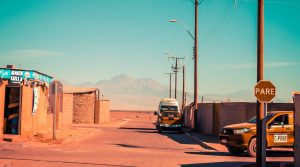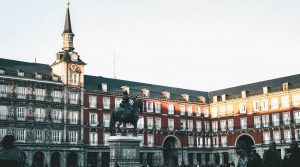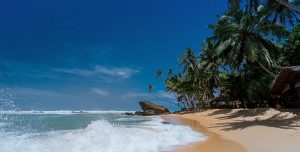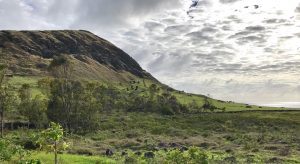Written From… the mountains of sunny Tegucigalpa, Honduras
My pulse raced as Delta Airlines flight 737 zigzagged over the mountainous terrain toward the airport runway. With a resounding thump, the plane dropped and hit the ground. It sped along the short tarmac with a loud whooshing sound and the pilot veered toward the final stop.
Passengers sighed with relief while erupting into raucous applause. We had just landed at Toncontin International Airport in Tegucigalpa, Honduras, which boasted one of the shortest and most frightening airstrips in the world. It was my first time landing on the perilous runway, and I applauded along with my fellow passengers.
Honduras, the original banana republic, is the largest and most mountainous country in Central America, and my latest country to call home. Dan, my husband, and I, moved to Tegucigalpa, the capital, after accepting contracts to work at the American school of Tegucigalpa, as principals. It was our first time working in a Spanish speaking country, and one that had a reputation for being dangerous.
We followed our fellow passengers out of the plane and walked across the sun-baked, concrete apron to get to the arrivals hall. Upon entering the small terminal we strode over to the sign marked, non-residents, and shuffled in line behind the others. Twenty young missionary volunteers attired in neon orange t-shirts with the name Holy Saviors emblazoned on the back, joined the long lines.
I smiled to myself at their festive shirts and excited chatter; they definitely brought a little liveliness to the otherwise dull room. When Dan and I finally made it up to the counter a grim-faced customs agent took our passports and after checking our photos and taking our thumb-prints, stamped each one with a loud thwack. “Gracias!” we said aloud and rushed toward the luggage carousels. After Dan located all six suitcases he pulled them off the rotating belt and we walked into the main part of the airport.
A crowd of young and old Hondurans swarmed the small area. They stood watching and waiting, blocking our path and making it difficult for us to push our two overflowing luggage carts through the congested mass. I held tight to the handle and managed to slide into an open space at the same time, Sofia, a colleague from the school, approached us.
She gave us a traditional Honduran greeting – a kiss on the cheek – and after the greetings, Dan immediately asked her where we could change American dollars into Honduran lempiras. Sofia led us into an outside hallway where shoeshine men sat dozing in tall chairs.
A friendly Honduran suddenly approached us, clutching a folded wad of bills. Recognizing him as the ‘money changer,’ Dan asked for his going rate and handed over our U.S. dollars. In return, the money-man gave him a small stack of five-hundred lempira notes, the largest paper bill issued in Honduras.
Dan stuffed his lempiras into his wallet just as a thin, coffee-skinned porter latched onto us and pushed our luggage cart toward the exit. Sofia led the way to the parking lot and the porter loaded our suitcases into her shiny, white SUV. When all was securely stored, Dan gave the man a tip and she pulled out into the crowded and noisy city streets navigating the bumper to bumper traffic with ease.
Along the way Sofia pointed out a few points of interest while keeping up a steady monologue. As she crested the many hills and barreled through the narrow side streets, I attempted to follow her diatribe with a few ooh’s and aah’s, however she spoke so fast she might as well have been speaking Spanish to us, right off the bat.
When we arrived at the Maya Hotel, our home for the next few days, Sofia pulled up to the entrance, and Dan and I jumped out. A hotel worker proceeded to unload our luggage, and with a quick wave and a ‘see you later,’ Sofia drove off.
“I wonder if we’ll ever see her again?” I asked as we both watched her SUV pull out and quickly round the corner. Inside the hotel Dan registered for our room while I looked around the opulent and spacious lobby.
Leafy, palm trees and pink bougainvillea bushes encircled the outdoor pool giving the scene a lush and tropical feel that I had been looking forward to. The open air restaurant’s many tables were already set with bud vases and place-settings for dinner.
“Now I feel like we really are in Central America!” I said to Dan. “Just look at all those gorgeous flowers!”
We rode up the elevator with our luggage in tow anxious to drop it off. After the quick flight from Wisconsin we still had enough energy left in our bodies to go out and explore the city. For once there was no mind-numbing jetlag, which we had endured while living in Cairo, Egypt, and New Delhi, India.
However, after the hotel staff informed us it would be way too dangerous to go sightseeing on our own, we settled for a quick dinner at a small Italian restaurant directly across the street from the hotel.
After our solo meal, where we were the only diners, since Hondurans eat very late, we walked the fifteen steps back to our hotel. Once inside our room, I flipped on the television. Our first night in Honduras was spent tuned into the country’s popular Spanish telenovelas.
Anxious the next morning to see the school we would be working at for the next two years, Dan and I got ready and left the hotel. A driver from the school picked us up and took us to the campus.
He drove past farmacias, food markets, and homes hidden behind walls, sporting loops of barbed wire at the very tops. Guards with machine guns stood outside banks and shopping malls and vehicles came by every which way, without any regard for speed limits or lanes.
It was now July, six months after we were interviewed and hired at a recruiting fair in Atlanta, Georgia, and we were anxious to see the school and meet our new co-workers. The van drove up to the locked gate and was met by several armed security guards who ushered us through. The van rambled down a slight hill and the driver parked alongside four school buses.
“Wow,” I remarked. “Security sure is tight here.”
Exiting the van and not sure which route to take onto the campus, Dan and I stood and waited in the blazing, hot sun for someone to come by and greet us, even offer us a tour of the school. But after waiting for ten minutes, we decided to go off on our own.
The school was small and located on a hill that overlooked houses with red-clay rooftops. We checked out the view from all sides and were pleasantly surprised at the modern looking buildings sandwiched together. Standing atop the highest hill, we saw the tall Christ statue, El Cristo de Picacho, which stands erect and overlooks all of Tegucigalpa and its barrios.
Tall white letters that spelled out Coca-Cola, reminiscent of the Hollywood sign in California, also stood high on a hill advertising the popular soda, and my drink of choice.
The beautiful and majestic Basilica de Suyapa, named after the patron saint of Honduras, also sat at the north end of the city. It was well known for its large stained glass windows and Hondurans believed it to be the place where la Virgen de Suyapa performed hundreds of miracles.
From a distance, the school buildings looked pristine and white, but as we got closer the cement walls were riddled with peeling paint and ceiling tiles were dark with mold (a recurring problem during the rainy season). The bountiful displays of green and flowering plants located throughout the school grounds helped to create an attractive campus, where classroom doors opened to the outdoors.
Around noon, when Dan and I completed our own tour, we stopped in to say hello to the director, Ms. Lopez, whom we hadn’t seen since she hired us in December. Ms. Lopez welcomed us enthusiastically and ushered us into her office.
I sank down onto her soft, cozy black leather couch and wanted to stay in her air-conditioned office forever. After making small talk about our flight and our hotel stay, Ms. Lopez suddenly got more serious. Her expression changed while she informed us that one of the high school students had recently been kidnapped.
“Ah, what did you just say?” Dan asked as he quickly glanced over at me, shock and concern written all over his face.
“I just found out that one of our tenth-graders was abducted at gunpoint last night,” Ms. Lopez explained in a matter-of-fact tone.
“So, uh, what is happening now?” Dan asked, looking terrified.
“Well, they’re trying to find him and the family is hoping to get the money together for his ransom.” She stated calmly.
“Uh-huh, so, uh, how does this happen? Why?” Dan continued his interrogation.
“Well, it happens sometimes to families who have a lot of land, or a lot of money. They become targeted and family members are abducted and held for a while. I am in contact with the family and they will let me know what’s going on. Right now we are all just waiting and praying.” She stated with finality moving the conversation on to other things that were more school related, and easier to discuss.
Later, after we left the director’s office and were back in the van headed for our hotel, Dan brought up the subject again. Ever the worrier, he cried, “Do you believe this? Oh God, what kind of dangerous place did we come to? There are high school students getting kidnapped here!”
We later learned that the abducted tenth-grade student was released to his family before the school year began. Seven years later, after that inauspicious beginning to my life in a new country, I still live and work in Honduras.
You never really get to know a place until you immerse yourself completely in the daily life of the culture. The kind and generous people of Honduras, and their strong connection to their religion and their families, helped to make me feel safe, happy, and content enough to now call it home.
My life as an international educator over the past 25 years has been more of a roller coaster ride, rather than one long holiday, as some people may think. Some days were bliss, like when the internet worked and hot water flowed from the faucet.
Other days were more challenging, especially when the power was off for an entire day. When I first went abroad, I conjured up images of white-sand beaches, mountainous vistas, and exciting travels to remote and exotic places.
However, despite visiting some amazing countries around the world, I have since adjusted to the realization that working abroad, mostly involves getting used to unpredictable crises, daily unexpected challenges, and the ever-present testing of my patience and resilience. Despite it all, I continue to live a life of adventure and inspiration.
Feature image: Mariamichelle – Pixabay
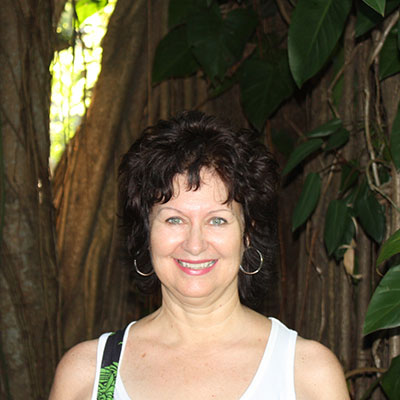
Jill is an international educator, travel writer, amateur photographer, and published author of two travel memoirs, who writes about her experiences living and working in schools and countries around the world. She presently lives in her seventh country, Honduras, with her husband, and Yorkie-Poo, Mickey. While working as an elementary principal, Jill also writes, reads, takes photos of the beautiful people and countries of Latin America, and muddles her way through the Spanish language. Jill loves her life as an international educator, and most days, feels like she is living her dream.
